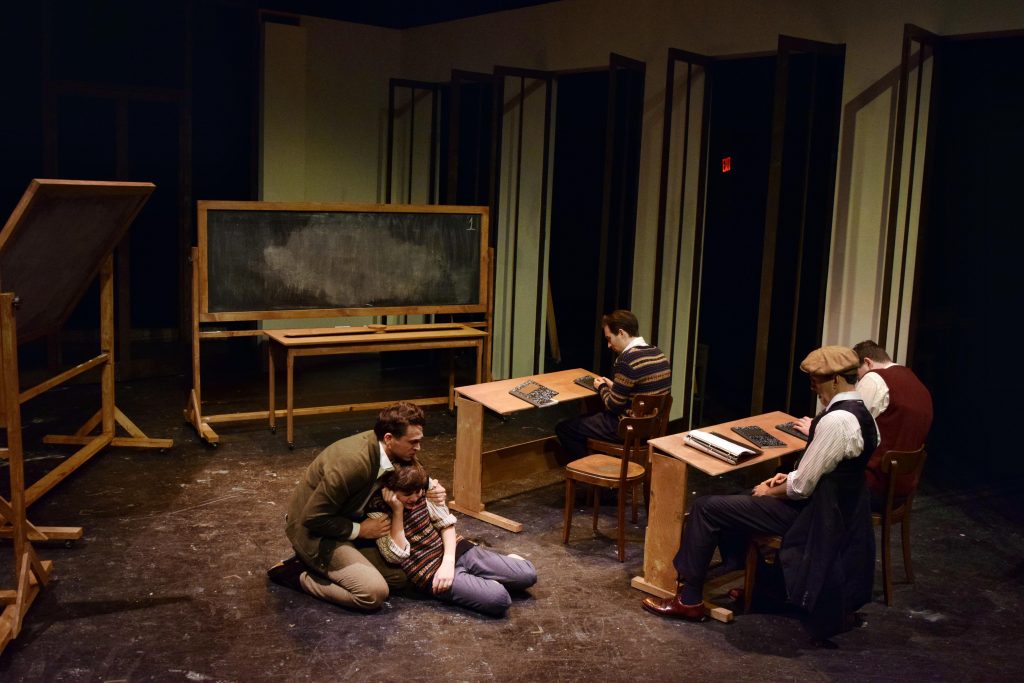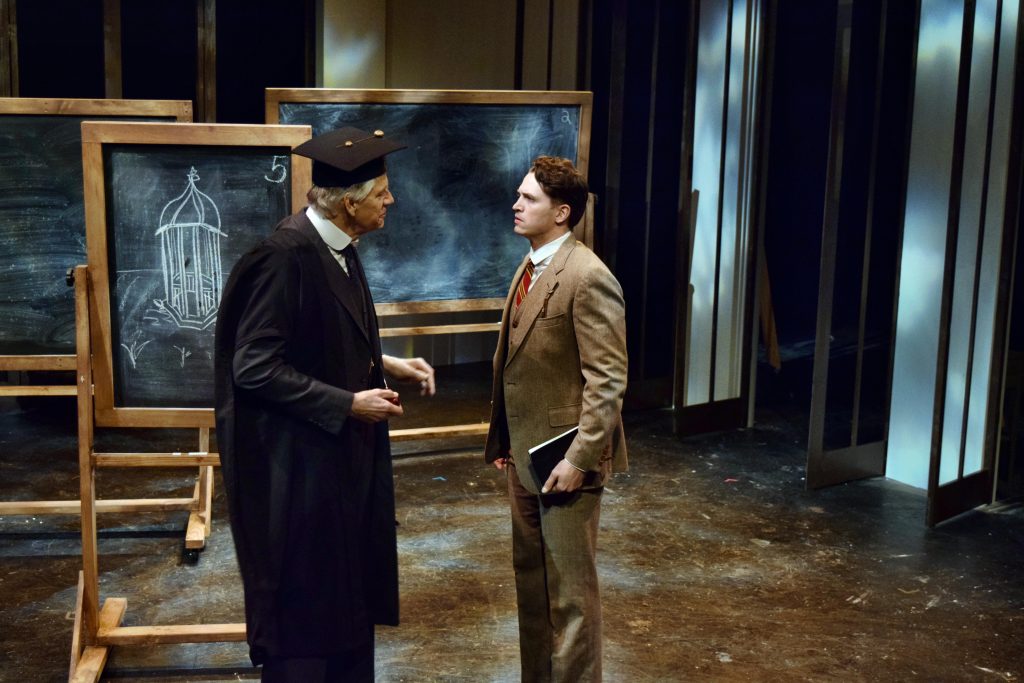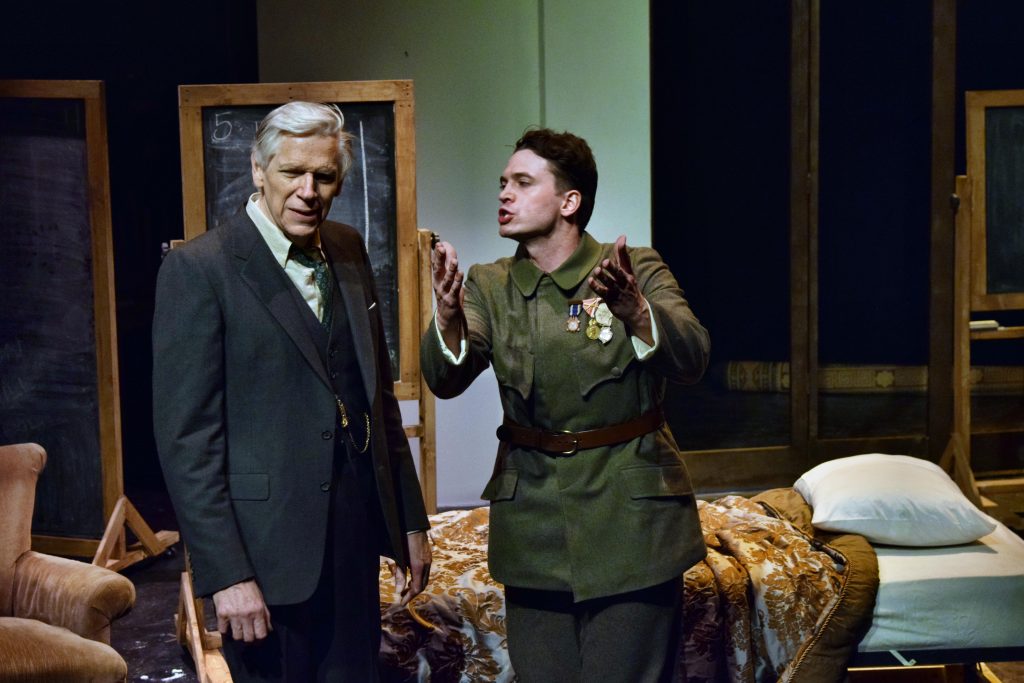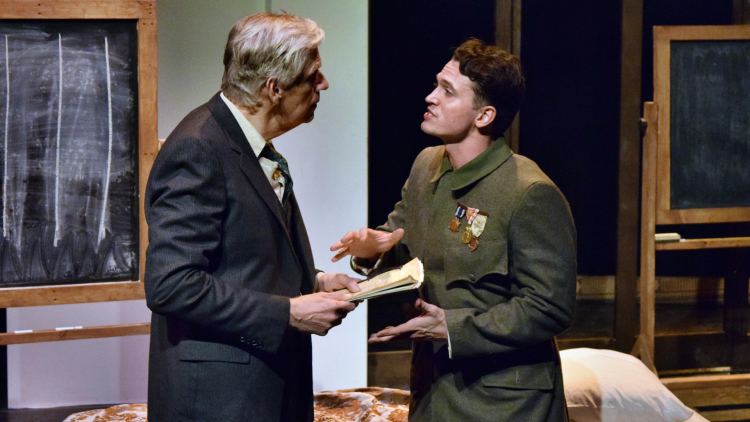‘Whereof one cannot speak, thereof one must be silent.’ A famously pregnant quote that, like much of Wittgenstein, defies easy interpretation, idiomatic translation. Though perhaps it could best be rendered as a variation on the old parental saw: ‘If you can’t say anything meaningful, don’t say anything at all.’
I mention it not only because it pops up for analysis in Douglas Lackey’s new play ‘Ludwig and Bertie’, but because it sums up the problem of translation and interpretation inherent to staging the life of the Austrian philosopher. For make no mistake, this is a show about Ludwig Wittgenstein. Bertrand Russell may share top billing, but his main function here is to marvel at the volatile young genius and be struck dumb by his non-sequiturs.
I mention the quote for yet another reason. As a critic, I find myself on the horns of a dilemma: Should I speak, or be silent? Here is a play whose very existence inspires hope for the future of intellectually engaging American theatre. Its scope is vast, its aims admirable. Yet I left the theatre feeling its reach had exceeded its grasp. If I criticise, I discourage others from attending; is this not an act of sabotage directed against precisely the sort of theatre I wish to encourage? However, if I praise, do I not betray my vocation and my readers, sending them off to the theatre to have their hopes disappointed? Worse still, do I not foster complacency in the artists themselves?
The alternative, of course, is to be silent.

Yet there is much to praise in ‘Ludwig and Bertie’: the intriguing set by Jon DeGaetano with its walls like de Chirico arcades and its ever-shifting phalanx of chalkboards, Stan Buturla’s stately yet humane performance as Bertrand Russell, Daniel Yaiullo’s charming, all-too-brief turn as Wittgenstein’s lover, Lackey’s thought-provoking, occasionally moving script.
And besides, as G.E. Moore points out in Lackey’s text, Wittgenstein hardly practiced what he preached; he spoke when logic counselled silence. Indeed, Philosophical Investigations represents a radical departure from the laconic rigour of the Tractatus.
So it is in the spirit of the former, of unfettered inquiry, that I submit to the reader these modest ‘Theatrical Investigations’:
1. The world may indeed be everything that is the case, but the world of the play need not contain everything that was the case. A few key events explored in greater depth.
1a. Case in point: A student (W) presents a professor (R) with a notebook containing the Tractatus in germinal form. A lucky glance at two now-famous quotes instantly convinces the latter of the former’s brilliance. Alternative: A heated, protracted debate. W pursues R, is rebuffed, eventually embraced. Literary precedent: Wagner’s visit to Faust/Mephistopheles.

2. The linear, episodic style of the Tractatus, translated into narrative structure, each scene following logically from the one preceding it, each with a clear point like the third term of a syllogism. But: Does this structure mirror W’s life, or only the manacles he forged to restrain the Dionysian chaos within? Where should the Dionysian be sought? Not merely in petulant outbursts, but in the structure itself, demolished, overturned.
3. In the blinding footlights of posthumous fame, the Great Man loses in humanity what he gains in stature. How was he actually seen by fellow students, for whom the name Wittgenstein meant nothing? Who were his enemies? Where is his equal and opposite, his antagonist? Why does he wield the poker against Russell, and not, as in reality, against the far less patient Popper?
3a. Parallel: In Orson Welles’s Napoleon, schoolchildren line up instinctively to welcome a new classmate, the young Bonaparte. Reality: the new pupil is shoved in the mud, and from mud is born imperial ambition.
4. The problem of didactic theatre (DT) as a special case of the problem of allegorical theatre (AT). In (DT), the moment a character begins to teach the audience, he ceases to be a character and becomes a mouthpiece for the author. The same occurs in (AT) when the audience perceives the character’s actions to be guided by the author’s message and not the character’s inner state. In both cases, the audience feels it has been tricked.
4a. The subproblem of philosophico-didactic theatre (PDT): Conclusions are static, premises dynamic. Philosophers, with few exceptions, present us with conclusions and, at best, the illusion of premises, like gifted pupils forced to ‘show their work’ on maths problems. The actual work of philosophy is emotive, intuitive, dialectical, dramatic. The presentation of conclusions, by contrast, is undramatic—even when wielding a poker.
4b. The possibility of philosophico-dramatic theatre (PDT) as an alternative to philosophico-didactic theatre (PDT) lies in the fact that the same set of symbols can represent multiple meanings. Rather than presenting static conclusions, as in (PDT), (PDT) involves the audience in the dynamic interpretative process.

4b1. ‘Ludwig and Bertie’ tends more towards (PDT) than (PDT), but there are some fine moments of (PDT) in which one witnesses a creator struggling dramatically with the birth of a BI (Big Idea).
5. No play (P) or review of a play (RP) about men who sit around discussing P and not-P should take itself too seriously. Thankfully, ‘Ludwig and Bertie’ for the most part does not.
5a. To P or not to P? If you (Q) have made it this far in RP, then P is probably for Q.
‘Ludwig and Bertie’ is playing at Theater for the New City through October 13. For information and tickets visit: theaterforthenewcity.net

